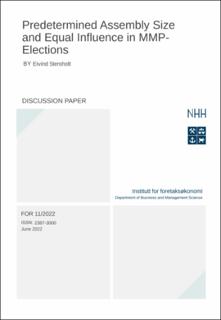Predetermined Assembly Size and Equal Influence in MMP-Elections
Working paper

Åpne
Permanent lenke
https://hdl.handle.net/11250/2999819Utgivelsesdato
2022-06-21Metadata
Vis full innførselSamlinger
- Discussion papers (FOR) [566]
Sammendrag
In MMP-elections (Mixed Member Proportional representation), a QP-ballot contains a first-vote for party Q’s candidate in a single-seat constituency and a second-vote for a list of candidates from party P in one common tally. In split ballots P≠Q.
Traditional accounting (e.g. in Bundestag elections) does not record a ballot’s combination of first- and second-vote; collecting them in separate ballot boxes will not change the result. The assembly size is out of control (111 extra-ordinary list seats in 2017 (137 in 2021).
Faithful accounting uses these combinations to obtain a predetermined size (the law’s Bundestag norm is 299 list seats), while still complying with MMP’s proportionality rule.
The Federal Constitutional Court emphasizes the principle of all voters’ equal influence on the result. In 2017 and 2021 many split QP-ballots gave full support to two winners, but QQ-ballots only to one (Q=CSU). Faithful accounting removes this and some other inequalities in voters’ influence on the election outcome.
The 2017 election achieved a unique transparency by giving top priority to (strict) proportionality. As the main example, it allows the following exposition of MMP with faithful accounting. A broader discussion in a wider setting, with references, is found in The Structure of MMP-elections.